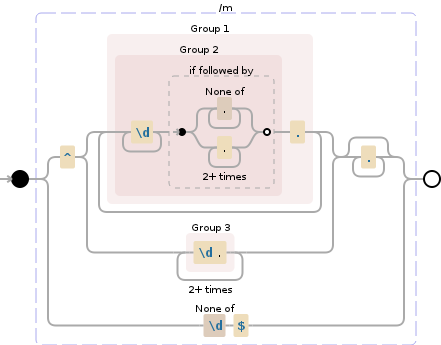I want to have a regular expression that match anything that is not a correct mathematical number. the list below is a sample list as input for regex:
1
1.7654
-2.5
2-
2.
m
2..3
2....233..6
2.2.8
2--5
6-4-9
So the first three (in Bold) should not get selected and the rest should. This is a close topic to another post but because of it's negative nature, it is different.
I'm using R but any regular expression will do I guess. The following is the best shot in the mentioned post:
a <- c("1", "1.7654", "-2.5", "2-", "2.", "m", "2..3", "2....233..6", "2.2.8", "2--5", "6-4-9")
grep(pattern="(-?0[.]\\d+)|(-?[1-9]+\\d*([.]\\d+)?)|0$", x=a)
which outputs:
\[1\] 1 2 3 4 5 7 8 9 10 11
You can use following regex :
^(?:((\d+(?=[^.]+|\.{2,})).)+|(\d\.){2,}).*|[^\d]+$
See demo https://regex101.com/r/tZ3uH0/6
Note that your regex engine should support look-ahead with variable length.and you need to use multi-line flag and as mentioned in comment you can use perl=T to active look-ahead in R.
this regex is contains 2 part that have been concatenated with an OR.first part is :
(?:((\d+(?=[^.]+|\.{2,})).)+|(\d\.){2,}).*
which will match a combination of digits that followed by anything except dot or by 2 or more dot.which the whole of this is within a capture group that can be repeat and instead of this group you can have a digit which followed by dot 2 or more time (for matching some strings like 2.3.4.) .
and at the second part we have [^\d]+ which will match anything except digit.

Debuggex Demo
a[grep("^-?\\d*(\\.?\\d*)$", a, invert=T)]
With a suggested edit from @Frank.
Speed Test
a <- rep(a, 1e4)
all.equal(a[is.na(as.numeric(a))], a[grep("^-?\\d+(\\.?\\d+)?$|^\\d+\\.$", a, invert=T)])
[1] TRUE
library(microbenchmark)
microbenchmark(dosc = a[is.na(as.numeric(a))],
plafort = a[grep("^-?\\d*(\\.?\\d*)$", a, invert=T)])
# Unit: milliseconds
# expr min lq mean median uq max neval
# dosc 27.83477 28.32346 28.69970 28.51254 28.76202 31.24695 100
# plafort 31.92118 32.14915 32.62036 32.33349 32.71107 35.12258 100
If you love us? You can donate to us via Paypal or buy me a coffee so we can maintain and grow! Thank you!
Donate Us With